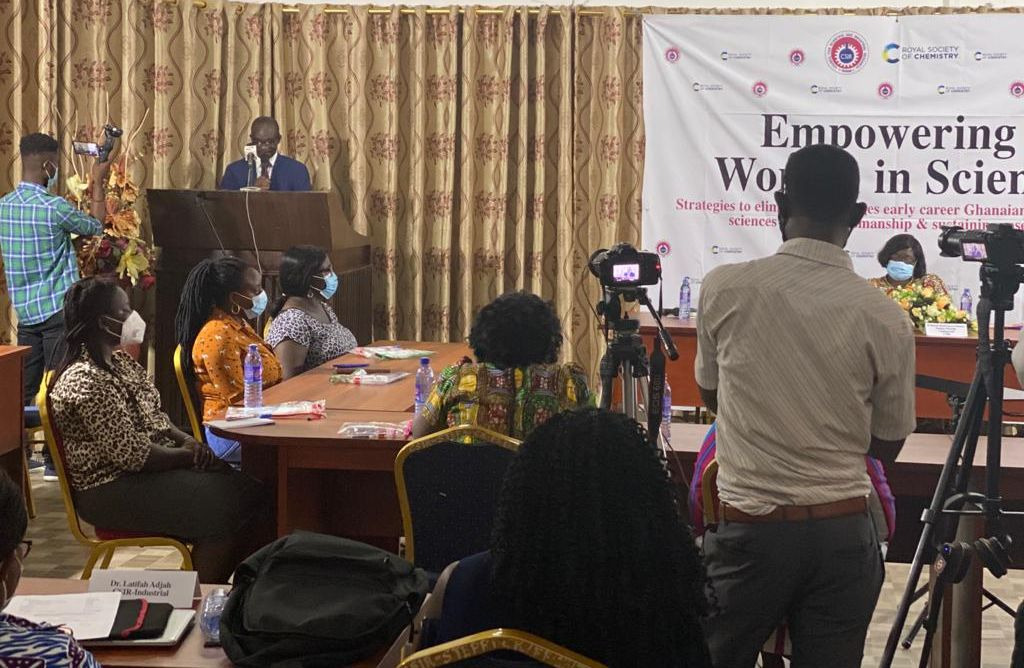
Audio By Carbonatix
The Council for Scientific and Industrial Research (CSIR) has organised a workshop aimed at empowering women in science.
It was under the theme, Empowering Women in Science: "Strategies to Eliminate Challenges Early Career Ghanaian Women in the Science Face: Grantsmanship and Sustaining Research".
Speaking at the day-day workshop, the Deputy-Director General CSIR, Professor Rose Mamaa Entsua-Mensah said women help to progress and advance the career of their male counters, yet such women never get recognised as authors during publication of research projects.
She said “though we live in a man's world, female scientists are trying to break the glass ceilings”, as some achievements of female scientists were glossed over.
Prof Entsua-Mensah noted that mentorship is key, as it plays a major role in the guidance of female scientists who face difficulty in moving on with their career as young scientists.
According to her, young female scientists who are lucky to have good mentors, succeed in their career by building networks, have research papers published, and often gain opportunities to work with seniors/experts in their career.
The Deputy-Director General revealed that in an absence of project funds, young female scientists are at a great disadvantage; this workshop would help young women to learn how to write winning proposals, as this plays a major role in research work.
The workshop, funded by the Royal Society of Chemistry’s Inclusion & Diversity Team United Kingdom, was awarded to an early career female Research Scientist with the CSIR-WRI, Dr Pennante Naa Ayikailey Bruce-Vanderpuije.
Over 30 participants from the Ghana Atomic Energy Commission, the Environmental Protection Agency of Ghana, the University of Ghana, the Ghana Standards Authority, and the CSIR- Water Research Institute.
Others include; Food Research Institute, Soil Research Institute, Institute of Industrial Research, Science and Technology Policy Research Institute, and Gulf of Guinea Maritime Institute.
The Animal Research Institute and the Crop Research Institute also had participants joining.
These participants were taken through presentations including Publish or Perish- Strategies to facilitate publication output, Mentoring: Effective mentor-mentee relationship and Opportunities available to early and mid-career researchers for growth, impact and visibility.
Other topics included multiple-role occupancy for a female research scientist, striking a balance-family life/research career, establishing good research collaborations, and Grantsmanship: step to develop and write a winning grant proposal.
The workshop further seeks to enhance the prospects of early-career Ghanaian women in science and academia by providing them with the basics of grantsmanship, ways to develop their research careers and afford participants the opportunity to interact with some of the most successful women in science for life-long mentoring.
Director of the CSIR-WRI, Prof Mike Osei-Atweneboana, said the early career woman in academia and science is faced with several challenges that undermine their involvement and development in scientific research, marginalising their professional career.
He said, although women in Ghana have made tremendous gains in entering science professions, they remain under-represented and estimated to be less than 15 per cent of scientific professionals.

Prof Osei-Atweneboana noted few women scientists possess the know-how to sustain their research career, including obtaining research grants to build a career.
“This calls for a conscious effort at mainstreaming gender in the development of a scientific career to ensure gender equality, equity and diversity,” he said.
He is hopeful that the workshop would provide adequate knowledge to enhance the career development of young female scientists in identifying unique opportunities globally.
The CSIR-WRI director said participants will also advance their career, identify mentors to guide them through their career choices, develop, sustain and advance their research career through collaborative efforts and progress to become independent scientists and find a balance between family and career responsibilities.
"As a director, I would love to see my female scientists become independent lead investigators and mentors to many, and I hope that this workshop would ignite their energies and propel them into a full-flight scientific professional,” he said.
Keynote speakers included Prof Mary Boadu from Ghana Atomic Energy Commission, Prof Mary Obodai of the Food Research Institute- CSIR, Prof Marian Nkansah and Dr Mercy Badu, both from Kwame Nkrumah University of Science and Technology (KNUST).
Others were Dr Edem Mahu from the University of Ghana, Dr Patricia Oboe and Dr Ruby Asmah, both from CSIR.
The CSIR-Water Research Institute is one of 13 Research Institutes of the Council for Scientific and Industrial Research, with the mandate to conduct research into all aspects of water resources, amongst others in order to provide scientific and technological information and services.
The Institute develops strategies, technologies and provides services for sustainable development, utilization and management of water resources to support the socio-economic advancement of the country.
Latest Stories
-
Mayweather to fight kickboxer before Pacquiao rematch
13 minutes -
India and Canada reset ties with ‘landmark’ nuclear energy deal
22 minutes -
Interior Ministry releases funds to settle 2025 rent allowance arrears for security services
1 hour -
Ghana evacuates diplomatic staff from Iran; embassy shut indefinitely — Ablakwa
1 hour -
France to boost nuclear arsenal and extend deterrence to European allies
2 hours -
Chinese community in Ghana marks ‘Year of the Horse’ with grand new year festival
2 hours -
When regional instability becomes national risk: Ghanaian tomato traders killings
2 hours -
Photos: President Mahama meets Tanzania President Suluhu Hassan
2 hours -
Mahama calls for cessation of Iran-US-Israel conflict, urging return to dialogue
2 hours -
Fuel prices could rise if Middle East conflict escalates – ACEP Boss
2 hours -
Elsie Addo Awadzi: Leadership reflections, one year on; 7 lessons from 7 years in public office
3 hours -
Finance Minister announces expiration of DDEP-induced restrictions on domestic bond issuance
3 hours -
Gov’t urged to aid private nursing training colleges to ease burden on public ones
3 hours -
Kumasi Mayor vows to keep Kejetia Market free from highly inflammable materials
3 hours -
Ghana safe from fuel supply disruptions amid Middle East tensions – Dr Oppong
3 hours

